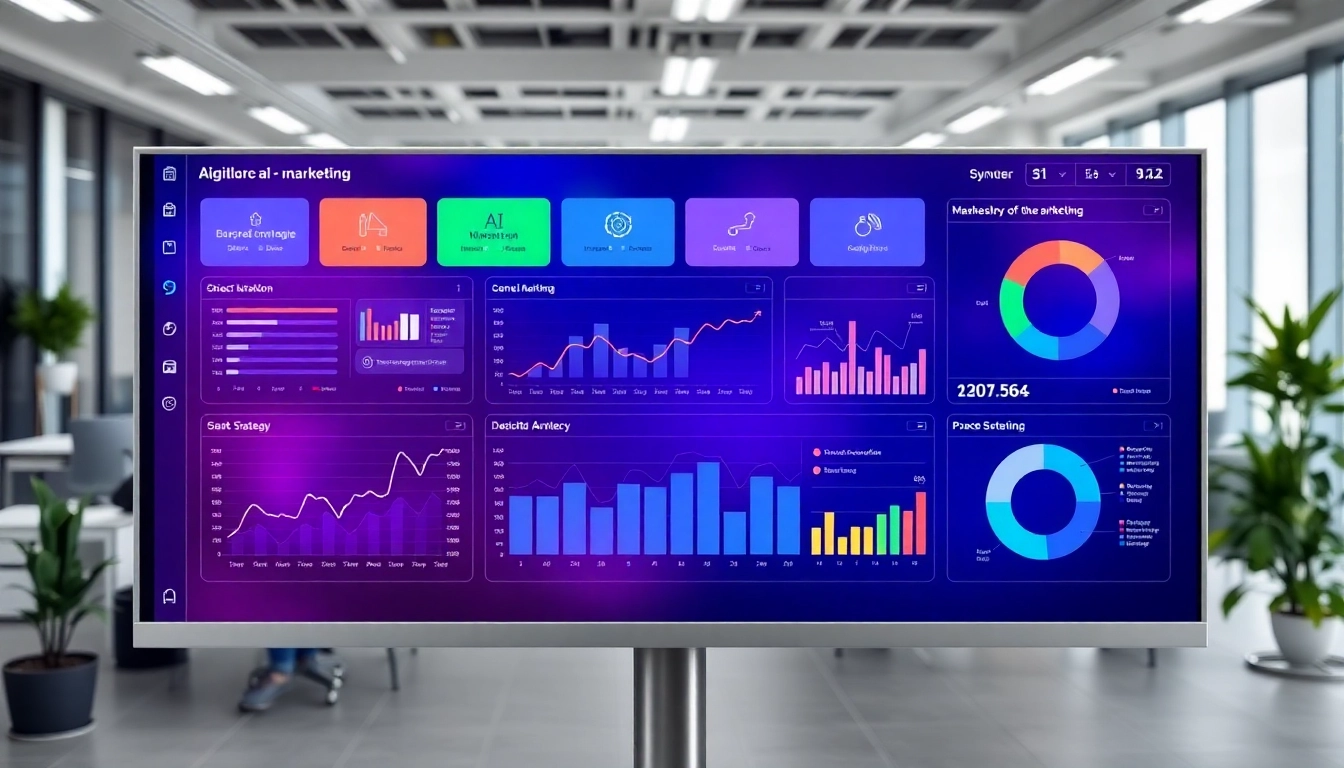Top AI Marketing Tools Revolutionizing Business Strategies in 2025
Understanding AI Marketing Tools
What Are AI Marketing Tools?
AI marketing tools are advanced technologies that leverage artificial intelligence to optimize various marketing functions. These tools are designed to automate repetitive tasks, analyze vast amounts of data, personalize customer interactions, and ultimately enhance marketing strategies. By integrating machine learning and natural language processing, AI marketing tools can help businesses improve their marketing campaigns, gain insights into consumer behavior, and create more engaging customer experiences.
From chatbots that handle customer inquiries to predictive analytics platforms that forecast market trends, the range of AI marketing tools is expansive. As businesses strive to stay competitive in an increasingly digital marketplace, utilizing AI marketing tools has become essential for effectively reaching and engaging audiences.
Key Benefits of Using AI in Marketing
The adoption of AI marketing tools can lead to numerous advantages, including:
- Enhanced Efficiency: Automation of routine tasks such as email marketing, social media posting, and data analysis frees up valuable time for marketing teams to focus on strategic initiatives.
- Data-Driven Insights: AI tools analyze vast datasets quickly and accurately, providing marketers with actionable insights that inform decision-making.
- Personalization: With AI, businesses can segment their audience and deliver personalized content and recommendations, increasing engagement and conversion rates.
- Improved Customer Experience: AI-powered chatbots and virtual assistants can enhance customer support by providing instant responses and personalized interactions.
- Cost Savings: By optimizing marketing efforts and reducing manual labor, businesses can ultimately lower their operational costs.
AI Technologies Driving Marketing Innovations
Various AI technologies are at the forefront of marketing innovations. These include:
- Machine Learning: This allows systems to learn from data and improve over time, which is crucial for predictive analytics and customer segmentation.
- Natural Language Processing (NLP): NLP is key in understanding and generating human language, making it essential for chatbots and content generation tools.
- Computer Vision: This technology enables AI to interpret and process visual information, useful in areas like social media, where images are integral to communication.
- Sentiment Analysis: This involves using natural language processing to gauge customer emotions based on their feedback, allowing businesses to adjust their strategies accordingly.
Must-Have AI Marketing Tools for 2025
Top 10 AI Tools for Content Creation
Content creation is a critical aspect of marketing, and AI tools can greatly enhance productivity and creativity. Here are ten leading AI tools that are redefining content creation:
- Jasper: This AI copywriting tool helps generate high-quality written content effortlessly, suitable for everything from blog posts to social media captions.
- Copy.ai: Copy.ai uses AI to assist marketers in creating engaging copy and advertisements, saving time and improving creativity.
- Surfer SEO: Combining content creation with SEO optimization, Surfer SEO analyzes high-ranking pages, helping users structure their articles for maximum reach.
- Writesonic: A versatile tool that generates articles, ads, and landing pages based on user prompts, enhancing productivity and creativity.
- Grammarly: While primarily a writing assistant, Grammarly’s AI can analyze writing tones and styles, helping content creators maintain consistency and clarity.
- Canva’s Magic Write: An AI feature within Canva that helps create text content for visual designs, allowing marketers to quickly fill templates with relevant information.
- Articoolo: This tool automatically generates concise articles based on keywords, assisting writers with short-form content needs.
- ContentBot: A comprehensive tool that generates various types of content, including emails, blog posts, and product descriptions.
- Quillbot: An AI-based paraphrasing tool that helps writers rephrase content effectively while preserving the original ideas.
- MarketMuse: This AI-driven content research platform helps optimize existing content and plan future pieces based on thorough analysis.
Best AI Tools for Social Media Management
Social media marketing requires agility and responsiveness, making AI tools invaluable for managing these platforms. Here are some of the best AI tools for social media management:
- Buffer: An all-in-one social media management tool that allows scheduling, publishing, and analyzing social media posts across multiple platforms.
- Hootsuite: Known for its comprehensive social media management capabilities, Hootsuite uses AI to suggest optimal posting times based on audience engagement metrics.
- Sprout Social: This platform provides detailed analytics and engagement tools, helping marketers understand their audience better.
- Later: A visual planning tool that allows users to schedule Instagram posts, ensuring all content aligns with overall marketing strategies.
- Canva: While primarily known for graphic design, Canva offers social media tools that leverage AI to generate engaging posts.
- FeedHive: Specializes in recycling content and tailoring posts to specific audiences based on AI-driven social media trends.
- Predis: Acts as a social media AI copilot, assisting users in generating posts and optimizing engagement strategies.
- BuzzSumo: Helps marketers understand trending topics, allowing them to create relevant content that resonates with their audience.
- SocialBee: Uses AI to suggest the best content to share, helping marketers maintain an active social media presence.
- Agorapulse: Offers social media inbox management powered by AI, helping marketers stay organized and responsive.
AI Analytics Tools to Measure Performance
Analytics are critical for understanding effectiveness and guiding future strategies. Here are some top AI analytics tools to consider:
- Google Analytics: The cornerstone of web analytics, Google Analytics now includes AI features that predict user behavior and offer actionable insights.
- Tableau: Tableau’s AI-powered analytics can transform raw data into insightful visuals, although it requires a bit of a learning curve.
- HubSpot: An all-in-one marketing platform, HubSpot uses AI to track customer journeys and analyze engagement, providing comprehensive insights.
- Mixpanel: This tool focuses on tracking user interactions within apps or websites, delivering powerful analytics for product-driven businesses.
- Kissmetrics: Known for its deep dive into customer behavior, Kissmetrics helps businesses understand their overall marketing performance.
- Crazy Egg: Provides insights on user behavior through heatmaps and session recordings, guiding marketers on how to improve site engagement.
- Ahrefs: Primarily an SEO tool, Ahrefs uses AI to analyze backlink profiles, helping marketers understand their website’s authority.
- Hotjar: Offers behavioral analytics and feedback tools, allowing businesses to understand how users interact with their website.
- Databox: A data visualization tool that integrates with other analytics platforms, providing real-time insights into campaign performance.
- Domo: Domo allows businesses to capitalize on their data, providing dashboard features that aggregate various analytical insights into one interface.
How to Implement AI Marketing Tools Effectively
Integrating AI Tools into Existing Strategies
Effective integration of AI marketing tools into existing marketing strategies requires careful planning and execution. Here are steps to ensure smooth implementation:
- Assessment of Needs: Identify existing pain points and areas where AI can provide significant value, whether in automation, analytics, or personalization.
- Selecting the Right Tools: Research and choose AI tools that align with business goals, existing technologies, and team capabilities.
- Pilot Testing: Start with a small-scale implementation or pilot project to test the tools and assess their effectiveness before a wider rollout.
- Full Integration: Once pilot testing is successful, strategically integrate the tools into existing processes, ensuring that all team members are aware of the changes.
- Continuous Evaluation: Monitor performance and user feedback continuously. Evaluate results and make adjustments as necessary to ensure optimal benefit.
Training Teams to Use AI Marketing Tools
Training staff to leverage new AI marketing tools is crucial for achieving the desired outcomes. Consider the following approaches:
- Structured Training Programs: Organize formal training sessions that provide in-depth knowledge of the tools and their functionalities.
- Hands-On Workshops: Implement hands-on workshops where team members can practice using the tools in real-world scenarios.
- Documentation: Provide comprehensive guides and documentation that staff can refer back to as they learn to navigate the tools.
- Encouraging Continuous Learning: Promote a culture of continuous learning by encouraging team members to explore new features and updates as they arise.
- Support Systems: Establish a support system for ongoing questions and challenges as teams begin to adopt the tools in their workflows.
Common Challenges and Solutions
The implementation of AI marketing tools may present certain challenges. Understanding these can help in devising effective solutions:
- Resistance to Change: Staff may resist new technologies. Encourage buy-in by highlighting the benefits and providing clear communication about the changes.
- Data Quality Issues: AI tools rely on quality data for accurate insights. Regularly audit data sources and cleanse data to ensure its reliability.
- Over-Reliance on AI: While AI can enhance capabilities, it shouldn’t replace human intuition. Ensure that teams continue to apply their judgment in decision-making processes.
- Integration Difficulties: Integrating AI tools with existing systems can be complex. Assess compatibility at the outset and seek expert guidance if needed.
- Underutilization: To avoid underutilizing AI tools, offer continuous training and encourage experimentation to uncover their full potential.
Case Studies: Success Stories with AI Marketing Tools
Small Business Growth with AI Solutions
Small businesses are increasingly turning to AI marketing tools to enhance their growth strategies. One notable example is a local boutique that integrated an AI-based inventory management system. The boutique utilized machine learning algorithms to analyze past sales data, optimizing their inventory levels and thereby reducing waste. As a result, this small business increased its annual sales by 30% as the right products were consistently available to meet customer demand.
Large Enterprises Leveraging AI Tools
Large corporations have also seen substantial benefits from adopting AI marketing tools. For instance, a leading global hotel chain implemented AI-powered chatbots on their website and mobile app to handle customer inquiries and bookings. This move not only improved customer service—reducing response times to mere seconds—but also drove a 15% increase in direct bookings. The hotel chain used data gathered from the chat interactions to further refine their targeted marketing campaigns.
Lessons Learned from AI Marketing Implementations
As businesses share their journeys of AI marketing tool implementations, several common lessons emerge:
- Start Small: Pilot projects often lead to greater success when scaling AI tools across an organization.
- Focus on Data: High-quality data is essential for maximizing the effectiveness of AI marketing tools.
- Encourage Team Collaboration: Engaging various departments in the adoption process often results in better insights and solutions.
- Stay Updated: The landscape of AI tools evolves rapidly. Continuous learning and adaptation are necessary to stay ahead of the curve.
- Track Performance Metrics: Establish clear KPIs and regularly evaluate the performance of AI tools to ensure they are meeting business objectives.
The Future of AI Marketing Tools
Trends to Watch in AI Marketing
The future of AI marketing tools is bright, with several trends expected to shape the industry:
- Greater Personalization: As AI technologies evolve, they will enable marketers to create even more personalized experiences for customers based on granular data.
- Enhanced Voice Search Capabilities: With the rise of voice-activated devices, optimizing AI tools for voice search will become essential.
- Integration of AR and VR: AI combined with augmented reality (AR) and virtual reality (VR) will create immersive experiences for customers.
- Focus on Ethical AI: As AI tools become more prevalent, ensuring ethical use and transparency will be crucial for companies to maintain customer trust.
- AI in Customer Relationships: AI tools will increasingly facilitate deeper relationships between brands and consumers, focusing on customer lifetime value.
Potential Challenges Ahead
Despite the promise of AI marketing tools, several potential challenges may arise:
- Data Privacy Concerns: As regulations governing data usage continue to evolve, businesses must navigate compliance while leveraging customer data responsibly.
- Technology Dependence: Businesses may become overly reliant on AI technology, leading to a loss of human touch in customer interactions. Balancing automation with personal engagement will be key.
- Skill Shortages: The growing demand for skilled professionals in AI and data analytics may create shortages in qualified personnel to implement and manage these tools effectively.
Preparing for an AI-Driven Market
To prepare for the future of AI marketing tools, businesses should:
- Invest in Training: Regular training programs will ensure that marketing teams are adept at leveraging AI tools.
- Stay Informed: Keeping abreast of advancements in AI technology and market trends will help businesses remain competitive.
- Foster Innovation: Encouraging innovative ideas and experimentation within teams will lead to novel applications of AI in marketing.
- Build Robust Data Strategies: Establishing solid data management practices will provide the foundation for effective AI tool usage.










